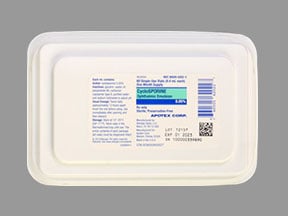
Cyclosporine Coupons & Savings Card – Discount Prices from $83.57
Generic for: Sandimmune, Restasis, Restasis multidose
My prescription
Edit
0.05%, Cyclosporine (60 Emulsions)
Select pharmacy

CVS
$83.57
COUPON PRICE
Albertsons
$120.70
COUPON PRICE
Walgreens
$128.40
COUPON PRICE
Walmart
$165.80
COUPON PRICECyclosporine savings card
Show this card to your pharmacist
CVS
$83.57
BIN
ID
PCN
GRP
019876
LH6FF5624C
CHIPPO
LHX
Powered by
More prescriptions for organ transplant
More prescriptions for organ transplant
Price history for Restasis (brand) & Cyclosporine (generic)
60 Emulsions, 0.05%
Average retail price for Restasis
Average retail price for Cyclosporine
Average SaveHealth price for Cyclosporine
Our price history data is based on aggregated prescription data collected from participating pharmacies in America. Our prescription data updates daily to reflect the latest price changes. If you notice a missing data point, it means there wasn't sufficient data available to generate a monetary value for that date.
We analyzed Cyclosporine prices for (0.05%, 60 Emulsions) over the last 12 months. The average retail price was $156.45, while the average price using the SaveHealth discount card was $119.22. That's a savings of approximately 23.80% when using our Cyclosporine coupon.
Compared to the generic version, Restasis had an average price of $2856.66 over the same time period. With the SaveHealth savings card, Cyclosporine is 95.83% cheaper on average than Restasis.
*Retail prices are based on pharmacy claims data, and may not be accurate when we don't have enough claims.
Cyclosporine dosage forms
Dosage Quantity Price from Per unit 0.05% 60 Emulsions $83.57 $1.39 0.05% 30 Emulsions $50.93 $1.70
| Dosage | Quantity | Price from | Per unit |
|---|---|---|---|
| 0.05% | 60 Emulsions | $83.57 | $1.39 |
| 0.05% | 30 Emulsions | $50.93 | $1.70 |
